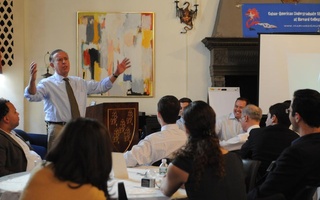Music is giving voice to minorities and the poor in Cuba, according to Nora Gámez Torres, a doctoral student at the Department of Sociology at City University in London.
Reggaeton—which often combines heavy beats, rapping, and Latin American rhythms—serves as a means of bringing the issues of the “underclass” in Cuba to the global stage, Torres said before the Harvard’s Cuban Studies Program on Monday afternoon.
The seminar examined what Torres, who is originally from Havana, characterized as the media’s hesitation to cover the poor in Cuba and how reggaeton artists use their music to express political dissatisfaction.
Torres said that the rising popularity of reggaeton in Cuba has seen backlash from some members of the Cuban government, who say that it is “capitalistic” in nature. Torres noted that some politicians point to reggaeton’s Puerto Rican roots as a means of deeming it unpatriotic. But she said that it is the message of the music that Cuban government officials truly dislike.
As the music is written in Cuba but produced in foreign countries, reggaeton artists have found a way to voice their concerns with the national political climate away from the pressures of the government, Torres said.
Still reggaeton artists are trying to make their art more palatable to Cuban culture, according to Torres. She mentioned one artist, Baby Lores, who had Fidel Castro’s image tattooed on his arm and subsequently wrote a song praising Cuba’s former Prime Minister and revolutionary war hero.
Musically, reggaeton artists have tried to write songs that are more in line with traditional Cuban music, responding to complaints from an older generation of musicians, who noted that the genre relies heavily on beats and sounds created from computer effects. As a result, reggaeton musicians have emphasized the vocal elements of their style, according to Torres.
At first Torres said she had a very negative reaction to the genre, but her opinion shifted after her nephew became a reggaeton producer and took her to a concert. Torres said her nephew told her “with this I can create something new,” noting that the novelty of the genre allowed him creative freedom. Torres said that her doctoral study was inspired by this experience.
The seminar was the first in a series of upcoming seminars this year that deal primarily with contemporary Cuban society and the history of the arts there. The seminars are open to the public and are organized by the Cuban Studies Program, which is a part of the David Rockefeller Center for Latin American Studies. Linda M. Rodriguez, the fellow in charge of the Cuban Studies Program, organized the seminar.
Rodriguez noted that Torres’ study of reggaeton as a means of giving voice to the disenfranchised “makes the contours of change in Cuba more visible.”
Read more in News
Court Upholds Sex Bias RulingRecommended Articles
-
Beyond the Embargo: Cuban ArtExhibition of prints exposes difficulties, talents of Cuban artists
-
 First Harvard Cuban-American Alumni Conference Convenes
First Harvard Cuban-American Alumni Conference Convenes -
Soros Fellowships Awarded to Grad StudentsHarvard students have claimed 10 of the 30 spots for this year’s Paul and Daisy Soros Fellowships for New Americans, which provide financial assistance to immigrants or children of immigrants who are pursuing graduate studies.
-
A First Course in CubaWhen the check came, Carlota started to say something to me, which I didn’t fully hear, or maybe just didn’t understand. All I heard was—"para nosotros." For us.
-
When Good Men Do NothingTo continue trading human rights in exchange for the false hope of limited reforms is to abandon the people of Cuba. Per Edmund Burke, “All that is necessary for the triumph of evil is that good men do nothing.”
-
What’s the Point?The Cuban Revolution has had a lasting influence on Latin America. The Cuban regime in the present day has very little.













